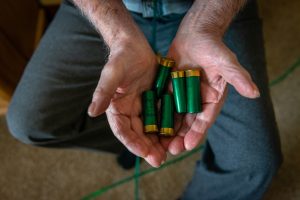About This Project
As more Americans are diagnosed with dementia, families who have firearms struggle with ways to stay safe.
In This Series:
Families Confront Dementia and Guns
What Families Can Do
Share Your Story
Read More
What can families do ahead of time?
Talk to your loved one about how to safely transfer ownership of their guns if they should become incapacitated. Consider writing a “gun trust,” a legal document outlining that process.
Doctors are legally allowed to inquire about access to firearms when a person is diagnosed with dementia. But, experts say, they often don’t. If the health provider doesn’t bring it up, families should ask about gun safety along with other concerns, such as driving and use of kitchen appliances and power tools.
What if a person with dementia wants to transfer their guns?
“No one should hesitate to accept a gun from a family member who is choosing to turn the gun over because of dementia,” said Lindsay Nichols, federal policy director at the Giffords Law Center to Prevent Gun Violence. Forty-eight states explicitly allow a person to transfer a gun to a family member without a background check, she said. In Connecticut and Rhode Island, a lawyer could justify the move based on interpretation of state law, but prosecution is unlikely, she said.
What if family members don’t want to accept guns?
Some law enforcement agencies will temporarily store guns if there’s a potential threat. In some cases, distressed families have dropped off firearms at gun shops or shooting ranges for safekeeping, though that is not ideal, noted Jacquelyn Clark, owner of Bristlecone Shooting, Training and Retail Center in Lakewood, Colo. Dealers may be able to buy or consign the guns.
What if the gun owner doesn’t want to give them up?
By federal law, a person loses the right to buy or own a gun if a judge deems them mentally incompetent to make decisions. Family members usually have to go to probate court for this kind of ruling, where they can be appointed as a guardian and take control of the guns.
What about veterans?
Veterans who have been deemed mentally incompetent to manage their finances also lose their right, under federal law, to buy or own guns. As of March, nearly 109,000 veterans were barred from gun ownership because of their enrollment in the Veterans Affairs fiduciary program.
What if they’re making threats?
In any state, police can take guns away from someone who threatens a specific crime. In the 11 states with “red flag” gun laws, law enforcement can seek a court order to temporarily seize guns from a person who exhibits dangerous behavior. In five of those states — California, Washington, Oregon, Maryland and New Jersey — family or household members can also initiate these gun-seizure requests.
What if families want to keep the guns at home?
Store the guns unloaded in a locked cabinet or safe, with the ammunition stored separately. You can also disable the guns, replace bullets with blanks or replace the guns with decoys, but that raises the risk of them being mistaken for a functioning weapon in an emergency.
Sources: Giffords Law Center to Prevent Gun Violence; state legislatures; Texas Alzheimer’s and Memory Disorders program at Texas Health; Bristlecone Shooting, Training and Retail Center

KHN’s coverage of these topics is supported by
Gordon and Betty Moore Foundation,
John A. Hartford Foundation and
The SCAN Foundation
